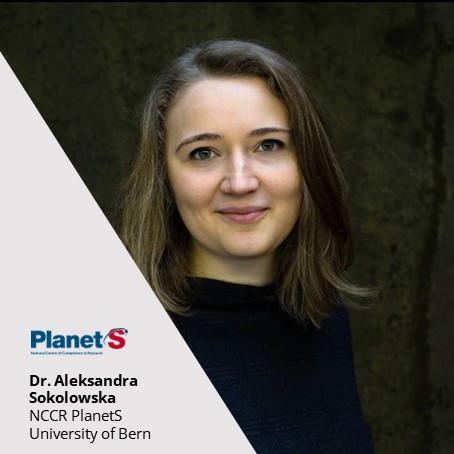Home › Dr. Aleksandra Sokolowska
Dr. Aleksandra Sokolowska
“This is why I founded women++, why I take the opportunities to lift people up, and why I am forever grateful to those who did the same for me when I needed it.”

I am a Scientific Researcher at the Planetary Imaging Group (PIG) at the University of Bern. These days I am particularly interested in what ejecta of impact craters can tell us about the past and present conditions on Mars, which requires combining remote sensing data and impact simulations. Before I joined NCCR PlanetS, I worked outside academia in various tech roles, and founded an educational non-profit focusing on tech and leadership skills called women++. But, to quote Jeffrey McDonnel, “freedom, of research topics, travel destinations, is a drug”. Perhaps this is why I did 2 things which are quite uncommon: I came back to space sciences ~4 years after my PhD, and I switched fields.
As a grad student, I was admitted to a special program called Fast Track PhD at the University of Zurich, which accelerated my PhD. I studied the formation of galaxies and their hot gas in the cosmic web but at some point I wanted to venture out of this niche and explore more. So I zoomed out, combed through textbooks in search of inspiration, and found the surface processes on Mars to be particularly interesting. However, at the time I was neither knowledgeable, nor bold enough to manage such a drastic switch and to obtain a postdoc position outside my field of expertise, where on top of that I knew no one. Only years later, and completely by chance, something happened that empowered me to go against all odds: I got a research job in yet a different field, I wrote my first proposal kind of for fun, and ended up on a waiting list to get funded.
This was a pivotal moment for me because it gave me a reason to believe that I was wrong about not having a chance to work in planetary sciences; I just needed to try harder. After some years of working in different countries and always taking on new kinds of challenges, I was also much more certain of my abilities, more determined, and knew how to work smarter. Hence, I dropped everything and focused on studying Martian geomorphology. I’ve also decided to get my own funding to do exactly what fascinates me rather than to try to join someone else’s work, thinking that it would give me the experience and freedom needed to pick the right job (and research topic) in the future. And so, thanks to the short-term funding from NCCR PlanetS Reserve and the University of Bern’s Initiator Grant, I was able to work on my first project. Meanwhile, I was applying for jobs and prestigious fellowships, one of which resulted in the Seal of Excellence from the Marie Sklodowska-Curie program. Today I am extremely happy because I will be working as a postdoctoral researcher at Brown University, on two kinds of surface processes on Mars.
I think that my younger self should know that in academia, which is rewarding hyper-achieving persons, it isn’t uncommon to lose touch with a deeper self. In addition, perfectionism, which is so prevalent among women due to gender socialization, is putting us at risk of being less assertive and more self-deprecatory, outspokenly or not. These glitches in the system let the talent fall through the cracks. This is why I founded women++, why I take the opportunities to lift people up, and why I am forever grateful to those who did the same for me when I needed it.

